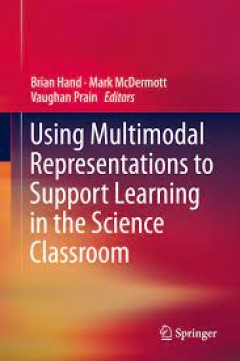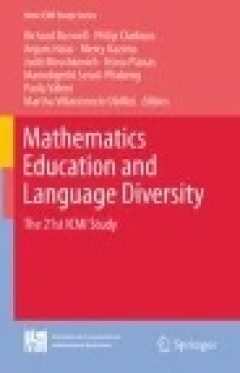Filter by

English as a Medium of Instruction in Higher Education
This book presents the multiple facets of English as a Medium of Instruction (EMI) in higher education across various academic disciplines, an area that is expected to grow constantly in response to the competitive global higher education market. The studies presented were conducted in various EMI classrooms, with data collected from observing and documenting the teaching activities, and from i…
- Edition
- 1
- ISBN/ISSN
- 978-981-10-4645-2
- Collation
- -
- Series Title
- English Language Education
- Call Number
- XIII, 213

Using Multimodal Representations to Support Learning in the Science Classroom
This book provides an international perspective of current work aimed at both clarifying the theoretical foundations for the use of multimodal representations as a part of effective science education pedagogy and the pragmatic application of research findings to actual classroom settings. Intended for a wide ranging audience from science education faculty members and researchers to classroom te…
- Edition
- -
- ISBN/ISSN
- 978-3-319-16450-2
- Collation
- -
- Series Title
- -
- Call Number
- -

The Future in Learning Science: What’s in it for the Learner?
This volume considers the future of science learning - what is being learned and how it is being learned - in formal and informal contexts for science education. To do this, the book explores major contemporary shifts in the forms of science that could or should be learned in the next 20 years, what forms of learning of that science should occur, and how that learning happens, including from th…
- Edition
- 1
- ISBN/ISSN
- 978-3-319-16543-1
- Collation
- XV, 299, 11 b/w illustrations
- Series Title
- -
- Call Number
- -

Mathematics Education and Language Diversity: The 21st ICMI Study
*THIS BOOK IS AVAILABLE AS OPEN ACCESS BOOK ON SPRINGERLINK* This book examines multiple facets of language diversity and mathematics education. It features renowned authors from around the world and explores the learning and teaching of mathematics in contexts that include multilingual classrooms, indigenous education, teacher education, blind and deaf learners, new media and tertiary educa…
- Edition
- -
- ISBN/ISSN
- 978-3-319-14511-2
- Collation
- -
- Series Title
- -
- Call Number
- -

Mathematics Education in the Early Years: Results from the POEM2 Conference, …
This book presents chapters based on papers presented at the second POEM conference on early mathematics learning. These chapters broaden the discussion about mathematics education in early childhood, by exploring the debate about construction versus instruction. Specific sections investigate the teaching and learning of mathematical processes and mathematical content, early childhood teacher d…
- Edition
- -
- ISBN/ISSN
- 978-3-319-23935-4
- Collation
- -
- Series Title
- -
- Call Number
- -

Mathematics Teaching and Learning: South Korean Elementary Teachers' Mathemat…
The purpose of this research is to identify the categories of South Korean elementary teachers’ knowledge for teaching mathematics. Emerging from the data collected and the subsequent analysis are five categories of South Korean elementary teachers’ knowledge for teaching mathematics: Mathematics Curriculum Knowledge, Mathematics Learner Knowledge, Fundamental Mathematics Conceptual Knowled…
- Edition
- -
- ISBN/ISSN
- 978-3-319-13542-7
- Collation
- -
- Series Title
- -
- Call Number
- -
 Computer Science, Information & General Works
Computer Science, Information & General Works  Philosophy & Psychology
Philosophy & Psychology  Religion
Religion  Social Sciences
Social Sciences  Language
Language  Pure Science
Pure Science  Applied Sciences
Applied Sciences  Art & Recreation
Art & Recreation  Literature
Literature  History & Geography
History & Geography